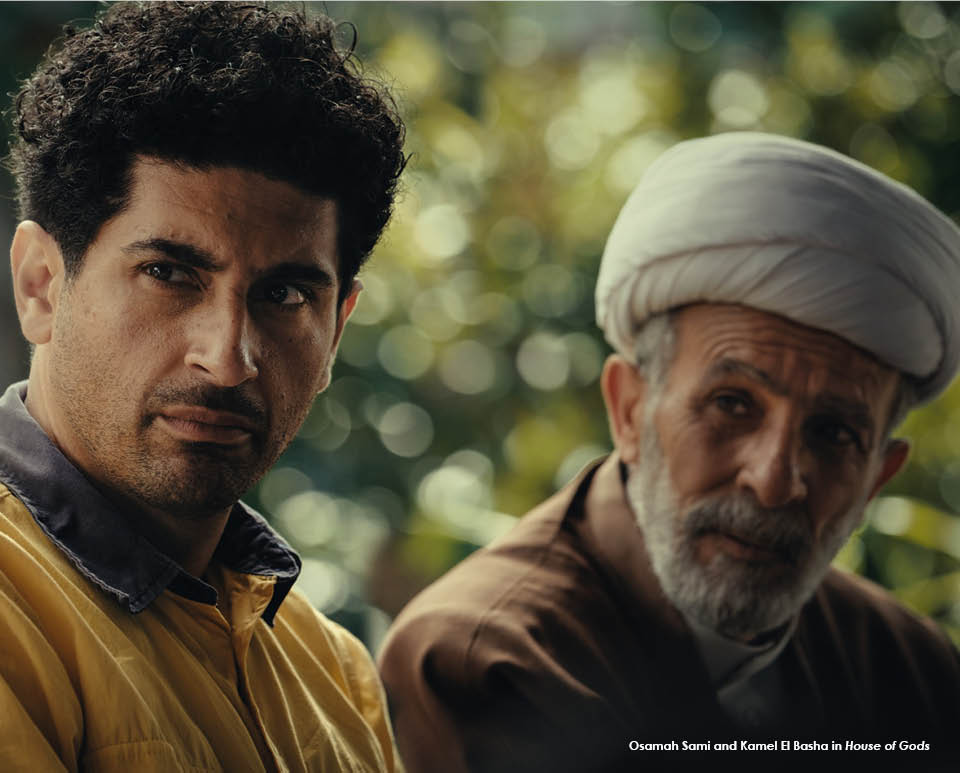
Matchbox Pictures’ "House of Gods" for Australia’s ABC has been described as "Succession" in a mosque. What the creators really wanted, first and foremost, was a universal family drama filled with love, hate, conflict, power struggles, rivalry, unforgettable characters and conversation-starter issues... that happens to play out around a mosque.
A few days before winning Series Mania’ Best Actor Award for his role in Matchbox Pictures’ "House of Gods" for Australia’s ABC, Palestinian actor Kamel El Basha said he cried after the Zoom call with the show’s Australian creator, writer and lead actor, Osamah Sami.
He hadn’t even read the script yet.
“Osamah was talking about the story… Iraq, Iran, being in prison… and after I finished my call, I started crying. I would cry for a long, long period. I felt that this is a very important story, that I’m in front of something that is big, something that I always wanted to do, about Muslim communities to be broadcast not only in Arab countries, but also abroad,” El Basha says.
Then he read the script, described by some as "Succession" in a mosque, but in reality was in the works before Succession attained blockbuster status.
Directed by Fadia Abboud, "House of Gods" is, according to the publicity material, “a tale of faith, family, secrets and lies [that] takes audiences behind the walls of an imam’s family and the community he leads, exploring the personal cost of power and ambition”.
El Basha’s character, Sheikh Mohammed, is a progressive and charismatic cleric standing for election to the top position at the Messenger mosque in western Sydney. His rival is conservative hardliner Seyyed Shaaker (played by Simon Elrahi).
Sami, known for his roles in "Ali’s Wedding" and "Shayda", stars as Sheikh Mohammed’s adopted son, Isa, who has a firm eye on status and power as his father’s right hand and does the wrong thing for what he sees as the right reasons. When Sheikh Mohammed appoints his eldest daughter Batul, played by Maia Abbas ("Savage River"), as his vice president, Isa finds himself resorting to desperate measures with potentially dire consequences. Safia Arain ("Pieces of Her") plays second daughter, Hind, an aspiring fashion designer.
“I felt… this is a big fish that I must grab with my feet,” El Basha said in an interview in the French town of Lille the day after the first two episodes of "House of Gods" premiered in S...
Matchbox Pictures’ "House of Gods" for Australia’s ABC has been described as "Succession" in a mosque. What the creators really wanted, first and foremost, was a universal family drama filled with love, hate, conflict, power struggles, rivalry, unforgettable characters and conversation-starter issues... that happens to play out around a mosque.
A few days before winning Series Mania’ Best Actor Award for his role in Matchbox Pictures’ "House of Gods" for Australia’s ABC, Palestinian actor Kamel El Basha said he cried after the Zoom call with the show’s Australian creator, writer and lead actor, Osamah Sami.
He hadn’t even read the script yet.
“Osamah was talking about the story… Iraq, Iran, being in prison… and after I finished my call, I started crying. I would cry for a long, long period. I felt that this is a very important story, that I’m in front of something that is big, something that I always wanted to do, about Muslim communities to be broadcast not only in Arab countries, but also abroad,” El Basha says.
Then he read the script, described by some as "Succession" in a mosque, but in reality was in the works before Succession attained blockbuster status.
Directed by Fadia Abboud, "House of Gods" is, according to the publicity material, “a tale of faith, family, secrets and lies [that] takes audiences behind the walls of an imam’s family and the community he leads, exploring the personal cost of power and ambition”.
El Basha’s character, Sheikh Mohammed, is a progressive and charismatic cleric standing for election to the top position at the Messenger mosque in western Sydney. His rival is conservative hardliner Seyyed Shaaker (played by Simon Elrahi).
Sami, known for his roles in "Ali’s Wedding" and "Shayda", stars as Sheikh Mohammed’s adopted son, Isa, who has a firm eye on status and power as his father’s right hand and does the wrong thing for what he sees as the right reasons. When Sheikh Mohammed appoints his eldest daughter Batul, played by Maia Abbas ("Savage River"), as his vice president, Isa finds himself resorting to desperate measures with potentially dire consequences. Safia Arain ("Pieces of Her") plays second daughter, Hind, an aspiring fashion designer.
“I felt… this is a big fish that I must grab with my feet,” El Basha said in an interview in the French town of Lille the day after the first two episodes of "House of Gods" premiered in Series Mania’s International Competition.
“My understanding of Islam is very, very close to Sheikh Mohammed’s understanding,” he said. “It’s a religion that gathers people that makes them come together. It’s about love. It’s about compassion. It’s about unity. It’s about understanding each other, understanding differences.”
For him, perhaps. Not everyone agrees with everything that made its way into the TV series.
There’s a scene, for instance, where Sheikh Mohammed wins the election, and his jubilant supporters at the mosque break out in dance.
In his review for U.K newspaper The Guardian, Mostafa Rachwani criticised the dance scene as “something that would be considered obscene in any mosque”. While no one in Lille on the day after the premiere mentions Rachwani by name, "House of Gods’" creators clearly don’t agree with him. The notion that dancing is banned in mosques is “not real”, says co-creator and co-writer, Shahin Shafaei ("A Dying King: The Shah of Iran").
“I think the worst reaction was reading somebody saying that you don’t dance in a mosque. You don’t get happy in the mosque, but that’s not real. Especially in a Shia Iraqi mosque. They celebrate… and everybody dances, they are that kind of culture,” Shafaei says in response to a question about the worst reaction to the series, which premiered on ABC TV in Australia on 25 February.
If there was much back and forth about commitment to authentic characters and storyline during the six-plus years of development, at the end of the day the production team highlights "House of Gods" as a drama – not a documentary – about the relationship between siblings and their father.
“All of them want attention, they have that rivalry, love for each other, hate for each other,” Shafaei says. “For us, to tell that family story was the most important thing. And then based on that, we got to tell the bigger stories in the community,” he adds.
Abbas, also in Lille for Series Mania, says “each character shows their love in different ways... Batul’s unwavering love for her father, faith, and community is what I love and resonate with the most,” she says.
Batul, who we find out early in the series is taking a break from a rocky marriage in Iraq, “comes across as tenacious and perhaps feisty, but that is her unique expression of love. I think that when we see female Muslim characters as assertive, there is a tendency to cast them in negative light, but I see that as her reclaiming her agency,” Abbas says.
Sami would be delighted if audiences walked away with a “little piece” of the drama that they could keep with them, “part of whichever family member they related to most… and on a different level for it to be a conversation starter… as a drama but also what it means on a society level”.
“If you see the show and you think ‘I’ve done things like that’, or ‘I felt like that’ or ‘my sister’s like that, or my brother’s like that, or my dad’s like that’. That’s a big win for us,” he says.
Executive producer, Sheila Jayadev, points to the universal ambitions of the drama, embedded in the choice of the plural ‘Gods’ in the name rather than the singular ‘God’ – another discussion point in Lille about how people use the word to refer to everyone/thing from deities and sports heroes to money.
“I’m fascinated by the idea of all the various religious Gods also being invoked in that, because that comes down to the universality of the series… because of what it says to be living in a diasporic community hanging on to your culture, navigating your path, balancing different cultures,” she says.
Others on the team add to the discussion on the name. How you use the word and the concept is related to language and culture, El Basha adds. “There’s so much discussion about it,” Abbas says. And it’s all good.
Shafaei says the series’ ability to generate conversation is his favourite response so far. The best for him was when a Pakistani journalist from a Muslim newspaper in Australia told Sami that she had to pause episode one to have a discussion with her father about the on-screen kiss that caused the fictional Sheikh Mohammed so much trouble.
“She said it was haram and could not happen, and her dad said it was alright. They spent 30 minutes debating, and then her father turns around and says, ‘you remember the match in such and such a year when Australia won and this Aussie woman next to me turned around just hugged me. Nothing happened. It was in the spirit of the moment’. And then she goes: ‘You never told us that’. Discussions like that are just gold, based on issues and stories that we have put forward,” Shafaei says.
Much of the series’ confidence in how it portrays its characters and their issues comes from Sami’s real-life experiences as the son of a leading Melbourne cleric, who was the inspiration for Sheikh Mohammed. “Osamah has the lived experience,” Shafaei says.
Sami totally owns his right to tell this story, as part of the community and also from “inside our heart”. “We’re not looking at these characters from above,” he says.
From 1995, when Sami was 12, to 2013, his father headed up a community that would attract 1,000 people to Friday prayers. “Just watching him take calls at night, during the day… He was their counsellor, therapist, teacher, guardian. He was their father, their coach… there were all the different initiatives he started – a theatre group, a soccer team, a women only pool day, lots of different services…you need strong leaders to be able to implement these,” Sami says.
“The mosque became more than a mosque. It became a hub where we gathered and we were able to express ourselves,” he adds.
El Basha cuts in: “It became a mosque”.
“Yeah,” Sami nods, in clear deference to his on-screen father.
Everything about the series is a deliberate invitation, into the mosque, into the characters’ homes, their backyards, “an invitation to come into an experience in a way that they haven’t seen before”, says Jayadev, who also produced Sami’s 2017 movie, "Ali’s Wedding".
Sami highlights an up-close-and-personal involvement with the characters in "House of Gods". There’s no stepping back, no observing from afar, he says, repeating his comments from the stage the previous evening following the packed screening.
“Our people, our community have been talked about in media, we’re talked about on the streets, in newspaper headlines.
But we’re not heard from, we’re not given a voice, we’re not listened to,” he says.
Shafaei and Sami set about changing this with "House of Gods".
Shafaei describes Sami’s father – a head cleric in Australia from 1995 to 2013, when he died – as a “very open minded progressive, a very gentle human being”.
“He would go against all the stereotypes… even for me as a Muslim… an Iranian, who was raised in a very religious setting. So having the pleasure of sitting in his sermons and singing in the mosque in Melbourne and knowing him… we had always spoken about how great it would be to tell his story,” Shafaei says.
And then they did, although it’s clear they didn’t anticipate it taking more than six years.
Today, Sami talks about what he thinks/hopes his father might say about his latest work: “My father once told me, ‘The same way the world needs doctors to heal the body, it needs storytellers to heal the soul’. I pray that he’s watching down with a warm soul”.
▶ Published in ContentAsia April 2024 magazine





























